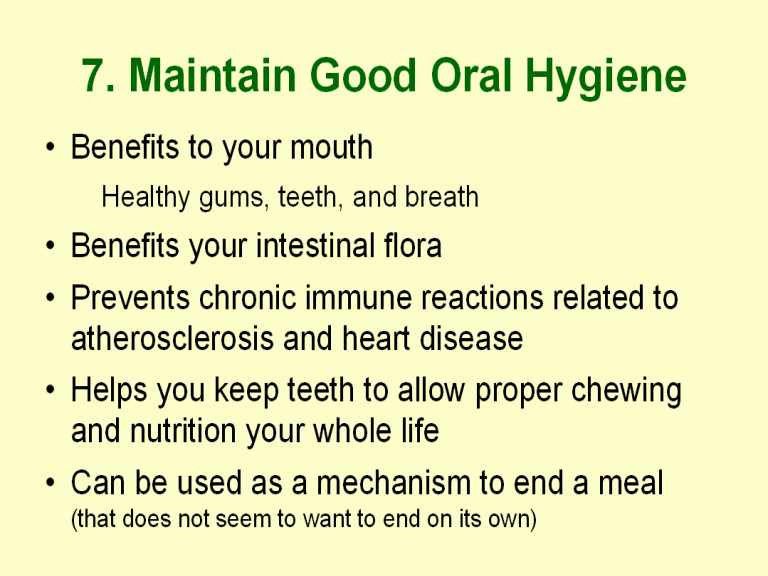Slide 14 of 15
Why is maintaining good oral hygiene important? The obvious thing, and what dentists tell you, is that it benefits your mouth, makes your gums healthy, makes your teeth healthy, and improves the odor of your breath. But there are also benefits to the bacterial flora of the mouth. There is only one other place, for the most part, in the body that has a flora anything close to what the colon has, and that's the mouth. It has a lot of anaerobic bacteria (can grow without oxygen), which means it's going to grow a more potentially pungent odor-producing kind of bacteria, and those that can produce certain types of chemicals that cause diseases like periodontitis and unique complications like tooth, gum, and bone decay. Every time you swallow, you swallow some of the bacteria in your mouth. As far as I can tell, the bacteria that grow in your gut is determined from the food you eat (i.e., the bacteria in the food and that grows from metabolism of the food) and the bacteria that live in your mouth (which is also influenced greatly by food choices) because the latter is the chronic, constant supply to the gut. So the better the flora is in your mouth, theoretically, the better the flora might be down in your intestine.
I have already told how important the flora of your intestine is for intestinal health and in inflammatory bowel diseases. One of the ways you can avoid providing "bad bacteria" to your gut is to avoid periodontitis, which is caused by the exact same bacteria that causes colitis, that same Bacteroides. This fact confirms my suspicion about the relationship of mouth flora and gut flora. Bad intestinal flora may mean bad mouth flora, although it may go the other way too, somehow, meaning that having a bad intestinal flora might somehow make the flora in your mouth worse. Also, we now know that chronic immune reactions from periodontitis are related to the formation of atherosclerosis and heart disease from immune response. So just like I am telling you that immune response from the bacteria in your gut causes widespread disease, probably all autoimmune disease, I believe this is now being seen from the mouth too.
If you don't keep your teeth, you can't maintain proper nutrition usually. After they are gone, you just can't chew every good food that you want to eat. So here's another reason to hold on to your teeth.
As I mentioned before, brushing can sometimes be the mechanism for saying that "This meal is over." Especially when it doesn't seem to want to end on its own. You are less likely to eat again once you have brushed your teeth, because that's an act that says "Oh, I now have a clean mouth. I don't want to eat again." Or you might say "Hey, it's 10 PM; I brushed my teeth, I'm not eating anymore." These are some tricks you can use to help avoid extending mealtime beyond its caloric purpose.
Next Slide
Back to FinerHealth.com Home Page













